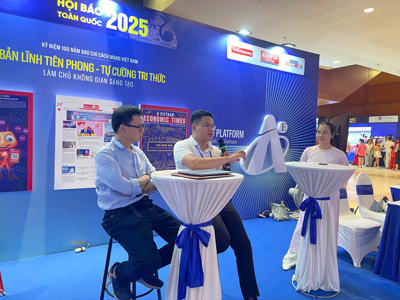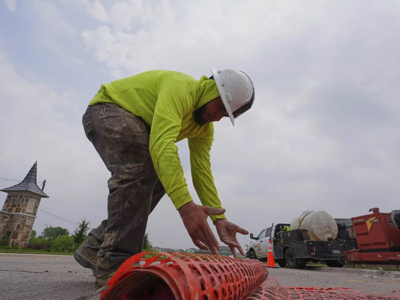The path to a green economy
Representatives from Chambers of Commerce in Vietnam suggested measures to support Vietnam’s transition to a green economy at the annual Vietnam Business Forum (VBF).

Mr. Gabor Fluit, Chairman of the European Chamber of Commerce in Vietnam (EuroCham):
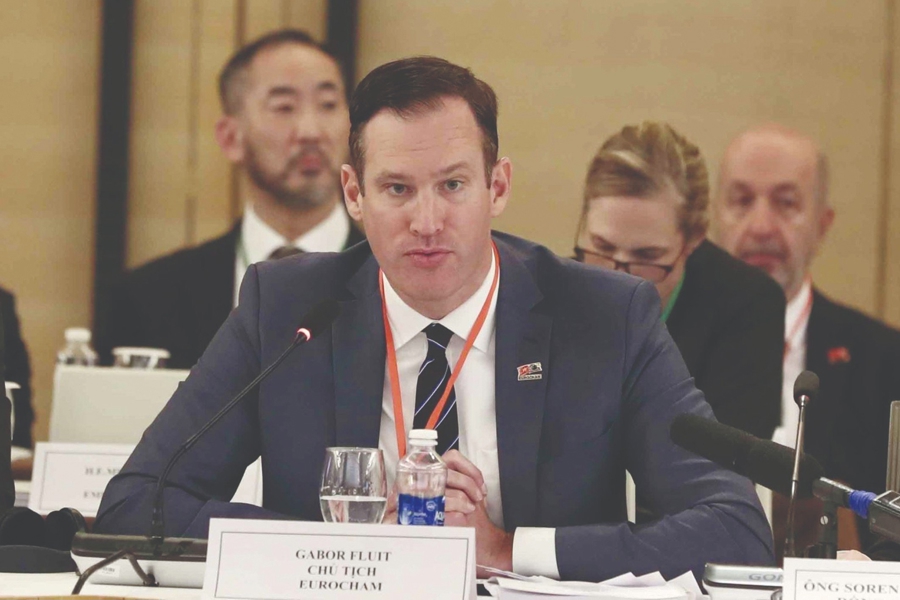
We believe that the most efficient and effective way for Vietnam to move forward and build a solid foundation for future development is by focusing on a green economy and sustainable development.
Embracing renewable energy is our most urgent and transformative task. For this, the government should allow and encourage all power consumers to access and invest in renewable energy alongside implementing energy efficiency. To reduce carbon emissions and promote a cleaner energy mix, it is essential to implement Power Development Plan 8 and all the necessary regulations, with the early inclusion of a coal offset strategy. Vietnam has abundant solar and wind energy resources, making it crucial to adapt institutions and infrastructure to enable a complete shift towards renewable energy. This includes green hydrogen, which can be supported by well-developed energy storage systems. Waste and water shortage issues can also be addressed with a circular economy framework. Despite progress in implementing the Extended Producer Responsibility Law, we recommend reinforcing fines on the enforcement of waste regulations and promoting alternative materials and, if not possible, compostable plastics, until plastic waste is significantly reduced.
To support Vietnam’s goal of becoming a leader in life sciences, EuroCham emphasizes enhancing access to pharmaceuticals and medical devices through optimized regulatory processes and global best practices.
As we move towards a sustainable future, we must combat climate change and environmental incidents in every aspect of our lives. This is especially important at healthcare facilities, which should be green and resilient. To achieve this, regulations, standards, and a roadmap for sustainable healthcare facilities in Vietnam must be established.
Vietnam also needs to captivate and retain exceptional talent. For this, existing work permit procedures should be streamlined. Let’s not forget that high-quality foreign investment is essential to Vietnam’s economic success. However, we cannot attract these investors without the ability to recruit and retain top talent. To do that, existing work permit procedures need to be simplified.
Furthermore, it is critical for the government to continue prioritizing a thorough digital transformation.
As for taxation, to remedy the impact of the impending global minimum tax rate (GMT), we suggest investment-encouraging measures. This could include implementing exemptions on import duties, extended land tax holidays, and cost-based incentives, especially for research and development costs.
Mr. Greg Testerman, Chairman of the American Chamber of Commerce in Vietnam (AmCham):
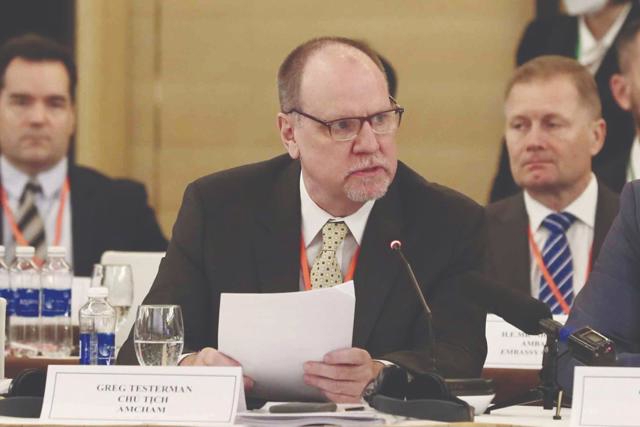
To achieve the net-zero emissions by 2050 goal, it will be necessary to prioritize energy sources that are both affordable and socially sustainable. This process will require financial and technical support from external sources.
Building on the COP26 commitments and the signing of the Just Energy Transition Partnership (JETP) between International Partners Group and Vietnam in December 2022 reflects practical assistance to the country’s ambitious climate targets, including a substantial increase in renewable energy by 2030.
These JETP targets are reflected in the recent draft of the Power Development Plan 8 in December 2022, which estimates an investment cost of $142 billion ($126 billion for power generation / sources and $16 billion for the power transmission grid) for the 2021-2030 period. Substantial project-based investment can come from the private sector very quickly if the regulatory regime allows.
We also urge authorities to continue allowing industrial parks to provide tenants with access to renewable energy. Crucial to many US manufacturers choosing Vietnam or elsewhere is access to renewable power in the immediate term. Plans for the expansion of current facilities or supply change relocations must include green energy. The proposed Direct Power Purchase Agreement (DPPA) is an important mechanism to attract investors and private investments, not only in the energy sector but also in other sectors where companies have made commitments in the renewable energy, carbon reduction, and sustainability space.
More could be done to finance Vietnam’s move away from fossil fuels. We encourage further consideration by authorities of a streamlined, easy-access legal framework to provide high-quality offshore gas, LNG, wind, solar, and transmission projects with the substantial funding they will require from international markets.
Crucial to attracting domestic and international investment are bankable power purchase agreements (PPA) for sustainable power. Green financing offers favorable rates to private investors to reduce carbon dioxide emissions, but the legal framework should be updated to clarify criteria for approving green finance.
Offshore wind presents great opportunities as a baseload contributor to the national grid. Again, Vietnam must address current legal uncertainties to unlock substantial international capital that is currently waiting on the sidelines.
Transmission is essential to make the overall system work. Batteries will play an important role in the country’s power and transmission stability. It is hoped that the government will soon develop a legal framework and market mechanisms for the development of clean, sustainable energy storage batteries in Vietnam.
Hydrogen could be part of a long-term solution. Vietnam should ensure that LNG turbines and piping and offshore wind projects are built with hydrogen in mind, but making renewable energy more available is most important right now.
Mr. Hong Sun, Chairman of the Korean Chamber of Commerce in Vietnam (KorCham):
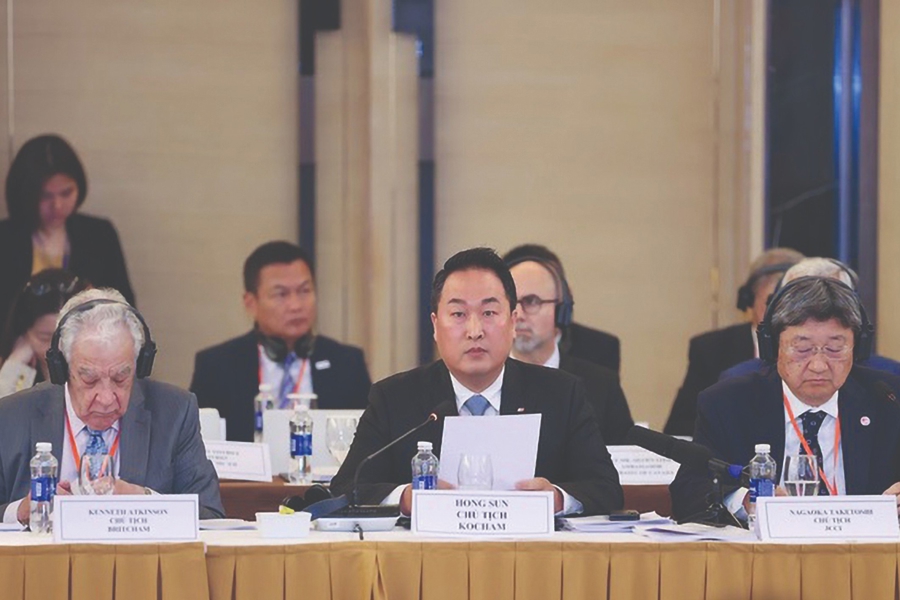
In December 2022, Vietnam signed the Fair Energy Transition Partnership (JETP) with nine countries, including the G7, and agreed to receive about $15.5 billion in support for five years for clean energy transition.
Under the JETP, the carbon emissions peak period will be shortened from the previous 35 years to 30 years and reductions in the capacity of coal-fired power plants will be boosted from the existing target of 37 GW to 30 GW by 2030 in order to achieve the goal of reducing greenhouse gas emissions by approximately 500 million tons, while the renewable energy generation rate was raised from the previous target of 36 to 47 per cent.
The South Korean Government, as a comprehensive strategic partner, actively supports the Vietnamese Government’s efforts to respond to climate change and reduce greenhouse gas emissions, and will further strengthen cooperation in technology and human resources support so that the JETP implementation goals can be conducted smoothly.
Considering the target capacity of coal-fired power plants to be reduced by 2030, it is inevitable to switch to fuel and change business rights for the four existing coal-fired power plants under development, which require agreement and approval from government agencies.
Coal-fired power projects being developed by South Korean power companies also fall under this category, and we request that the Vietnamese Government actively support the clean energy transition process.
Mr. Nagaoka Teketoshi, Chairman of the Japanese Chamber of Commerce and Industry in Vietnam (JCCI):
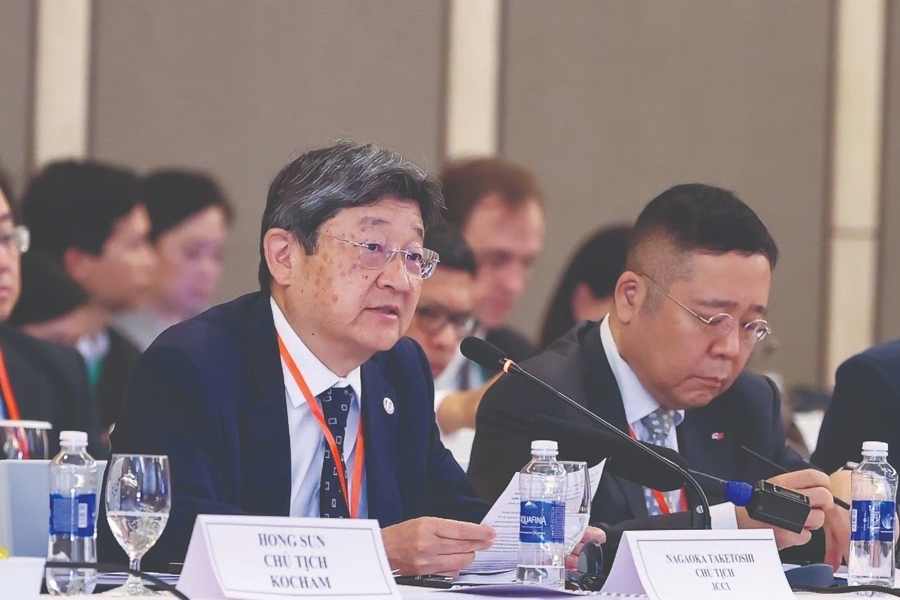
Japanese companies would like to contribute to a realistic energy transition in Vietnam by promoting the private investment and social application of decarbonization technologies necessary to reach the carbon neutrality goal. Japan has similarities in energy structure and energy security to Vietnam, and I think various Japanese decarbonization measures such as zero-emission thermal power technologies, energy-saving technologies, as well as on-site power generation and storage have a high affinity with Vietnam’s energy policy. To promote further cooperation with the Vietnamese Government in the future, we have four requests.
Firstly, shortly release the Power Development Plan 8. Amid growing electricity demand, Vietnam is facing power shortages, especially at industrial parks in the north. For this, the early release of the PDP8 is essential to ensure investments in power generation in line with the growth of the economy.
Secondly, soon implement gas-fired power generation. Gas-fired power generation contributes to meeting the rapidly rising demand for electricity and facilitates the introduction of renewable energy.
Thirdly, amend existing investment and PPP laws. Large-scale power generation projects such as gas-fired power generation and offshore wind power generation cannot be fully implemented by Vietnamese companies and local banks alone in terms of technology and finance, and it is essential to attract foreign companies and financial institutions. However, the current system provides insufficient or uncertain support to investors, which undermines the predictability and bankability of foreign-invested enterprises.
Finally, promote rooftop solar power and the early introduction of direct power purchase agreements (DPPAs) for the purpose of promoting renewable power. We would also ask for the relaxation of eligibility requirements under current DPPAs, with purchases of at least 30 MW per customer.
Mr. Kenneth Atkinson, Chairman of the British Chamber of Commerce and Industry in Vietnam (BritCham):
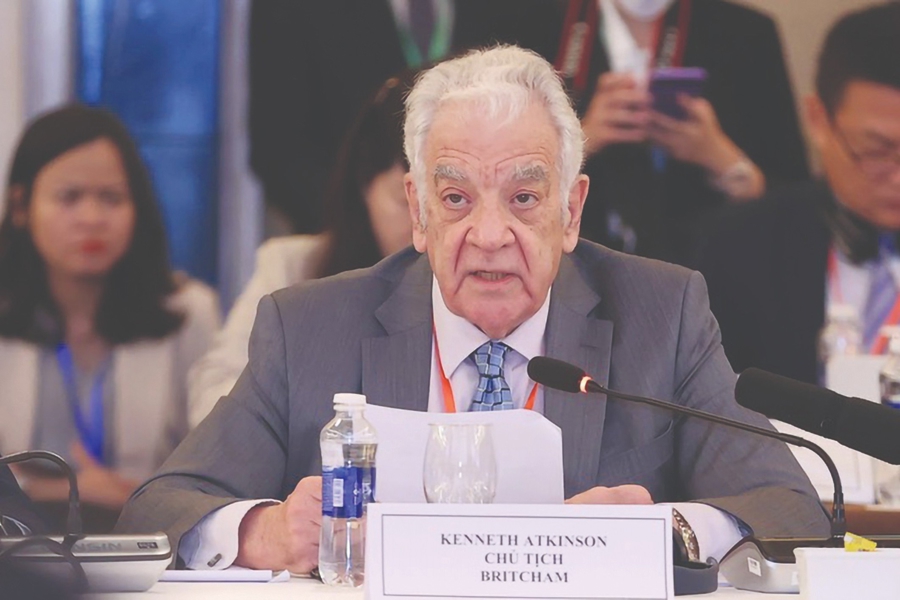
We appreciate Vietnam’s commitments at COP26 to reach net-zero emissions and the government’s efforts to drive this agenda. This has attracted British investment into renewable energy in Vietnam, especially offshore wind power projects. We recommend the early finalization of the Power Development Plan 8 (PDP8), which prioritizes renewable energy sources to minimize negative environmental impacts caused by electricity production.
We were pleased to witness the historic agreement on the Just Energy Transition Partnership (JETP) between Vietnam and international partners. To achieve the ambitious goals, we recommend the government provide incentives for manufacturers / importers using PCR to replace virgin plastics in their packaging and provide carbon credits for enterprises implementing decarbonization initiatives.
The early opening of Vietnam’s borders was vital for businesses to recover from 2020 and 2021. However, a greater issue for British and other investors is the strict application of visa and work permit rules, causing a loss of confidence in Vietnam’s commitment to encourage foreign funding and facilitate the entry of non-nationals employed by British companies.
We also see potential in the healthcare sector and urge the government to improve access to innovative medicines, accelerate digital health, encourage clinical trials, and facilitate technology transfer for local medicine manufacturing. We welcome legislative changes to align Vietnam’s regulations with international practices and we hope these revisions will create a positive impact.
We request strengthened inter-government alignment and a clear process for obtaining licenses with strict timescales and an appeal line to remove barriers hindering the growth of the education sector.
Mr. David Whitehead, Member of the Board of Directors of the Australian Chamber of Commerce and Industry (Auscham), and Representative of Associate Chambers at the Vietnam Business Forum:
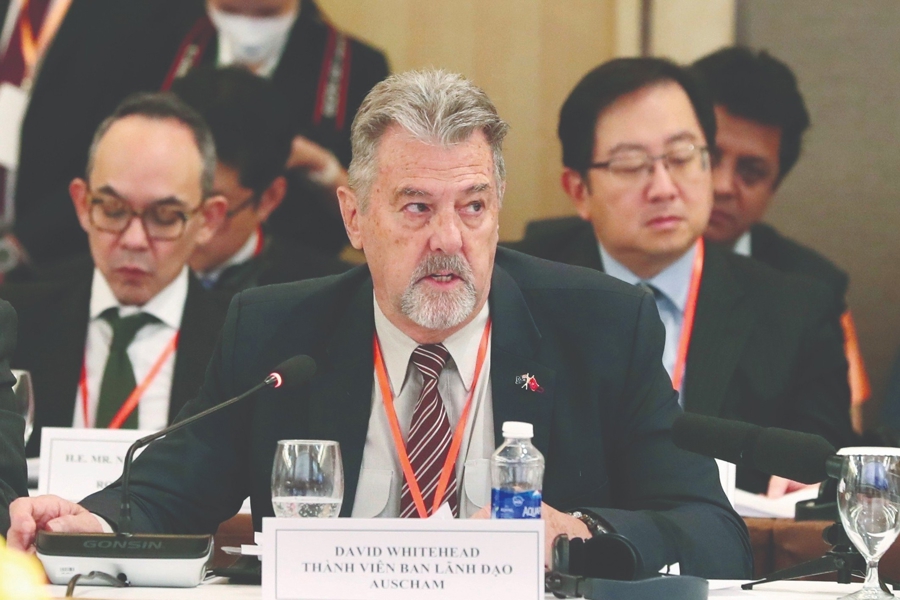
In 2023, we need to thoroughly resolve a number of important business-related issues, of which the most important is responsible and effective environmental management, which requires environmental, social, governance (ESG) and the use of “green” handling methods. We are all aware of the need to work with the Vietnamese Government to promote green growth in all industries.
It would be helpful if the government considered reducing or removing fuel taxes and levies. Customs clearance procedures should be expedited, and cargo handling capacity needs to be increased by improving capacity at seaports, airports, and at main border gates. We look for government support for leading businesses and FDI enterprises in important sectors such as aviation, transport, construction, and distribution.
The International Labor Organization estimates there will be huge increases in unemployment as a result of Covid-19. We need more concentration on job creation and speeding up disbursement of funds for key projects to alleviate this problem.
We need increased investment in transport and infrastructure projects, the development of routes linking major population centers, and the prioritization of climate, environmental, and food security projects, such as salinity intrusion in the Mekong Delta region.
Covid-19 has shown that an economy heavily reliant on value chains in other countries is highly vulnerable once there are supply chain disruptions. And we recognize that large countries and multinational organizations have clearly recognized that dependence on China is a high-risk strategy. And they are taking steps to relocate most production systems back to their home country or to other countries to diversify supply sources, shorten supply chains, and minimize risk. This presents a great opportunity for Vietnam in general and for FDI in particular.
The increase in the cost of manufacturing has impacted and will continue to impact Vietnam’s ability to sell on the global market. Tax exemptions and tax support is continuously required for FDI businesses, in order to encourage new international entries and ensure continuity of existing business operations.
The need to revitalize tourism and reactivate the hospitality sector is a necessity in attracting tourist spending and stimulating the flagging tourism sector.






